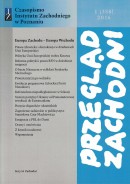Bilans polskiej prezydencji w Radzie Unii Europejskiej
An Assessment of the Polish Presidency of the Council of European Union
Author(s): Janusz Józef WęcSubject(s): Politics / Political Sciences
Published by: Instytut Zachodni im. Zygmunta Wojciechowskiego
Summary/Abstract: The article deals with the assessment of Polish presidency of the Council of Europe. The author presents the strategic (priorities) and operational program of the Polish presidency, the limitations it encountered, and the major achievements and failures of the Polish government in the realization of preset goals (their categorization is provided). The most important achievements of the Polish presidency include: adoption of a package of regulations reinforcing the control of public finances of the member states of the eurozone and the European Union; achievement of a compromise on the EU general budget for 2012; start of negotiations on the long term financial framework for 2014-2020; initiation of debate on the reform of cohesion policy after 2013; continuation of work on the EU’s energy security; prolongation of the program of food aid for the most deprived EU citizens; further progress in the realization of the EU enlargement strategy; the Eastern partnership summit; completion of negotiation on the signing of the Association Agreement with Ukraine and beginning of similar negotiations with Georgia and Moldova; continuation of debate on the deepening of the internal market and sources of growth; legislative work on the introduction of a unified patent system and new regulations in the area of freedom, security and justice. In assessing the failures it must be noted that they were mostly due to a negative attitude of some EU member states or third countries to the Polish initiatives, while only a few can be attributed to negligence of the presidency as such. To the first category certainly belong the following: the lack of a unified stand toward Belarus in the Warsaw declaration; the lack of signing the Association Agreement with Ukraine; lack of admission of Bulgaria and Romania to the Schengen sphere; lack of realization of preset goals in a common policy on security and defense; lack of progress in accession negotiations with Turkey; lack of progress in work on the reform of the Schengen system. The second category of failures includes: a rather passive attitude of the Polish presidency during the UN climate conference in Durban; lack of realization of preset goals in a common agricultural policy; lack of substantial progress in negotiations on the reform of a common fishing policy and in the area of social and employment policy.
Journal: Przegląd Zachodni
- Issue Year: 342/2012
- Issue No: 02
- Page Range: 3-32
- Page Count: 30
- Language: Polish

